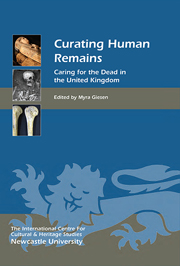Book contents
- Frontmatter
- Contents
- List of Illustrations
- Acknowledgments
- List of abbreviations
- Introduction: Human Remains Curation in the United Kingdom
- 1 International Perspectives towards Human Remains Curation
- 2 Dealings with the Dead: A Personal Consideration of the Ongoing Human Remains Debate
- 3 Care, Custody and Display of Human Remains: Legal and Ethical Obligations
- 4 The Impact and Effectiveness of the Human Tissue Act 2004 and the Guidance for the Care of Human Remains in Museums in England
- 5 Dead and Forgotten? Some Observations on Human Remains Documentation in the UK
- 6 Tethering Time and Tide? Human Remains Guidance and Legislation for Scottish Museums
- 7 The Quick and the Deid: A Scottish Perspective on Caring for Human Remains at the Perth Museum and Art Gallery
- 8 The Museum of London: An Overview of Policies and Practice
- 9 Curating Human Remains in a Regional Museum: Policy and Practice at the Great North Museum: Hancock
- 10 Curation of Human Remains at St Peter's Church, Barton-upon-Humber, England
- 11 Archaeological Human Remains and Laboratories: Attaining Acceptable Standards for Curating Skeletal Remains for Teaching and Research
- 12 ‘No Room at the Inn’ … Contract Archaeology and the Storage of Human Remains
- 13 Changes in Policy for Excavating Human Remains in England and Wales
- 14 Conclusions and Ways Forward
- Appendix 1 DCMS Guidance for the Care of Human Remains in Museums: Contents page and Part 2
- Appendix 2 MGS Guidelines for the Care of Human Remains in Scottish Museum Collections: Contents page and Chapter 2
- List of Contributors
- Index
- Miscellaneous Endmatter
1 - International Perspectives towards Human Remains Curation
Published online by Cambridge University Press: 05 May 2013
- Frontmatter
- Contents
- List of Illustrations
- Acknowledgments
- List of abbreviations
- Introduction: Human Remains Curation in the United Kingdom
- 1 International Perspectives towards Human Remains Curation
- 2 Dealings with the Dead: A Personal Consideration of the Ongoing Human Remains Debate
- 3 Care, Custody and Display of Human Remains: Legal and Ethical Obligations
- 4 The Impact and Effectiveness of the Human Tissue Act 2004 and the Guidance for the Care of Human Remains in Museums in England
- 5 Dead and Forgotten? Some Observations on Human Remains Documentation in the UK
- 6 Tethering Time and Tide? Human Remains Guidance and Legislation for Scottish Museums
- 7 The Quick and the Deid: A Scottish Perspective on Caring for Human Remains at the Perth Museum and Art Gallery
- 8 The Museum of London: An Overview of Policies and Practice
- 9 Curating Human Remains in a Regional Museum: Policy and Practice at the Great North Museum: Hancock
- 10 Curation of Human Remains at St Peter's Church, Barton-upon-Humber, England
- 11 Archaeological Human Remains and Laboratories: Attaining Acceptable Standards for Curating Skeletal Remains for Teaching and Research
- 12 ‘No Room at the Inn’ … Contract Archaeology and the Storage of Human Remains
- 13 Changes in Policy for Excavating Human Remains in England and Wales
- 14 Conclusions and Ways Forward
- Appendix 1 DCMS Guidance for the Care of Human Remains in Museums: Contents page and Part 2
- Appendix 2 MGS Guidelines for the Care of Human Remains in Scottish Museum Collections: Contents page and Chapter 2
- List of Contributors
- Index
- Miscellaneous Endmatter
Summary
Introduction
The primary purpose of this book is to discuss the curation of human remains within the United Kingdom (UK). However, one can only understand UK issues if one is also aware of how remains are viewed, defined and curated elsewhere in the world. Legal and social considerations differ widely among and between countries and cultures relative to the handling of human remains (Clegg et al in press; Lohman and Goodnow 2006). The goal of this chapter is to provide examples of international perspectives to place UK issues into a broader context.
obviously, individual and local perspectives on human remains are driven by many factors, but simplistically, they are usually rooted in historic and/or legal differences among countries. However, it is not the intention here to provide a treatise on different legal systems, but rather to discuss core reasons why perspectives are what they are and then to place them into a useful context for consideration relative to UK curation issues. For example, the most basic core question is ‘what are human remains?’
This question seems trivial on the surface, but how you answer it will vary depending upon your view of the recent versus ancient dead, whether the remains are those of your ancestors versus your enemies' ancestors, or whether they are medical specimens, mummies, or collections on display or in storage.
- Type
- Chapter
- Information
- Curating Human RemainsCaring for the Dead in the United Kingdom, pp. 13 - 24Publisher: Boydell & BrewerPrint publication year: 2013



